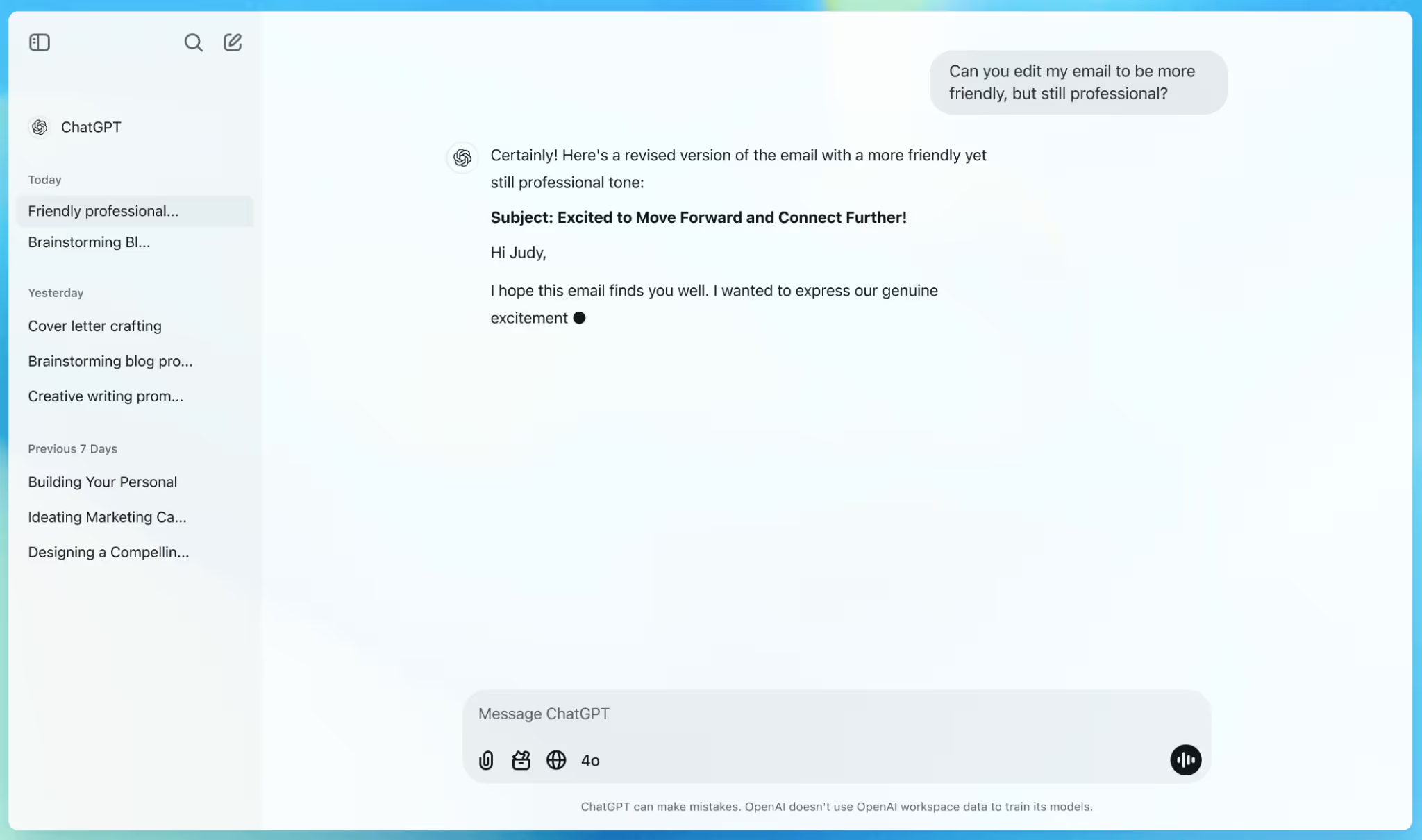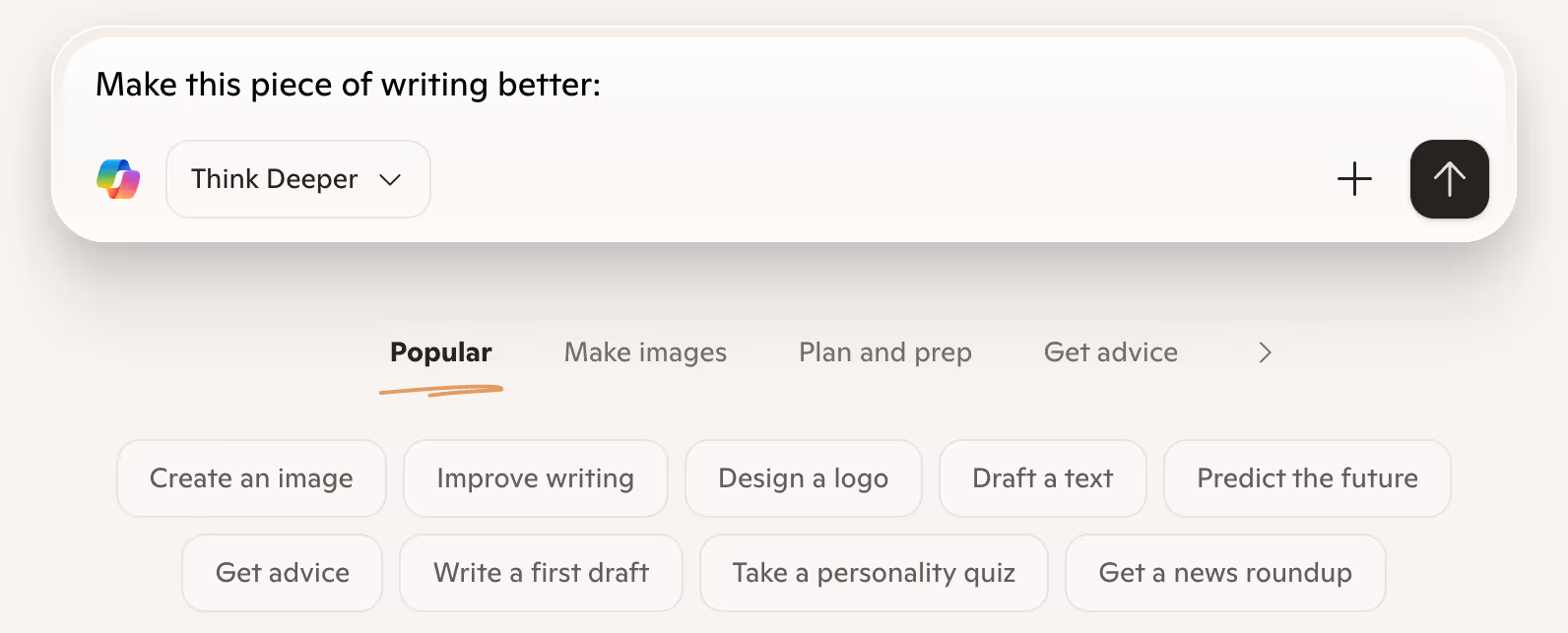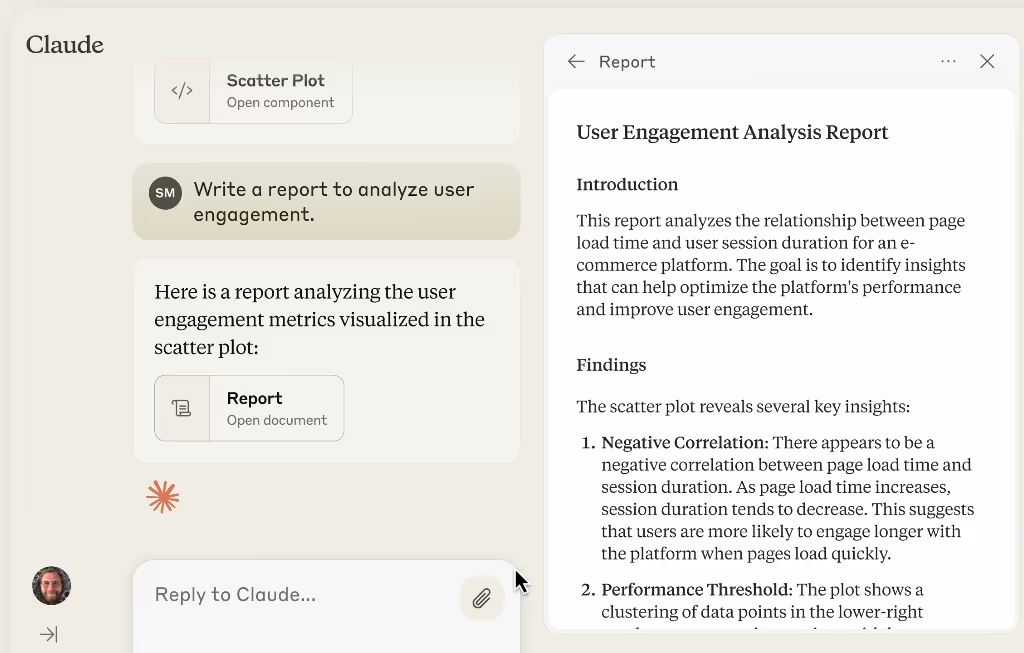AI assistants have quickly moved from experimental tools to everyday work companions. They’re now embedded in how teams write, code, research, and collaborate. From scheduling meetings and drafting emails to analyzing data and summarizing complex information, these tools are designed to reduce manual effort and free up time for higher-value work.
Customer service teams use chatbots to handle common questions, freeing agents for more complex issues. Marketing professionals rely on AI to generate content ideas and analyze campaign performance, while finance teams automate reporting and monitor trends. Across sectors, AI assistants help people work more efficiently and make smarter decisions.
In this article, we’ll break down the most popular AI assistants: ChatGPT, Gemini, Copilot, Claude, Perplexity, and Grok, covering their pros, cons, pricing, and best-fit use cases to help you decide which one is right for you.
Overview of Most Popular AI Tools
The most popular AI assistants today include ChatGPT, Gemini, Copilot, Claude, Perplexity, and Grok. Each was designed with different capabilities and strengths in mind. ChatGPT is a versatile all-rounder for general users, Gemini integrates tightly with Google tools, Copilot shines in developer and Microsoft workflows, Claude emphasizes safe and accurate outputs, Perplexity specializes in real-time knowledge retrieval, and Grok is optimized for fast, conversational use on social platforms.
While they fall under the same category, their target users and ideal use cases vary. Users often prefer ChatGPT for business or Gemini for broad tasks. Developers benefit from Copilot’s deep coding assistance, while Claude is popular in research-heavy or compliance-focused environments. Perplexity is the go-to for up-to-date, source-backed answers, and Grok caters to users needing quick responses in chat-driven contexts.
Ultimately, choosing the right assistant depends on how well it fits your workflow and goals.
ChatGPT

OpenAI’s AI assistant, known for its versatility across industries and everyday use cases. It combines strong reasoning skills with creative flexibility, making it one of the most widely adopted tools.
Pros
- Highly versatile across tasks: ChatGPT can handle a wide range of tasks, from drafting professional emails and marketing content to brainstorming ideas, assisting with coding, and even summarizing research. This flexibility makes it suitable for both individual users and teams in multiple industries.
- Strong integration ecosystem: With APIs, plugins, and compatibility across a wide variety of apps, ChatGPT can be embedded into existing workflows, allowing automation in project management, CRM systems, and more.
- Customizable communication style: It can adapt tone, formatting, and depth based on the user’s needs, making it suitable for formal reports, casual chats, or even social media copy.
Cons
- Context retention limits: In extended conversations, ChatGPT may lose track of previous messages, requiring users to repeat or clarify information.
- Occasional inaccuracies: The model can produce confident but incorrect answers, so users must verify critical information, especially in professional settings.
- Generalist approach: While it performs well across many tasks, it may lack the depth of specialized tools in areas like enterprise workflow automation, coding, or legal research.
ChatGPT pricing: Free tier; ChatGPT Plus from $20/user/month.
Gemini

Google’s AI assistant, deeply embedded into Google Workspace apps like Gmail, Docs, and Sheets. It’s designed for collaboration and productivity, especially in team environments.
Pros
- Automation and smart recommendations: It can identify repetitive tasks or patterns in workflows and propose ways to streamline them, saving time and improving team efficiency.
- Built for collaboration: Gemini emphasizes teamwork, providing shared workspaces, document recommendations, and AI-assisted suggestions that help multiple users work efficiently on the same project.
- Deep Google Workspace integration: Perfect for Gmail, Docs, Drive, and Meet users, Gemini can generate emails, summarize Docs, or analyze Sheets data directly within Google’s ecosystem.
Cons
- Limited third-party integrations: While it excels within Google Workspace, Gemini may be less flexible for organizations using a variety of other software.
- Maturing features: Some advanced functionalities are still under development, which can affect consistency in workflows.
- Frequent updates: While updates bring improvements, they may also cause minor instability for enterprise users depending on consistent performance.
Gemini pricing: Free tier; business pro plans from $20/user/month, enterprise from $30/user/month.
Gemini vs ChatGPT: Which is best?
While ChatGPT is known for its creative versatility, polished outputs, and wide integrations, Gemini (by Google DeepMind) is designed for seamless multimodal performance, combining text, images, and even code with deep connections to Google’s ecosystem. ChatGPT is best for content creation, productivity, and everyday workflows, while Gemini is ideal if you need tight integration with Google tools or advanced multimodal capabilities.
Copilot

Microsoft’s AI assistant, tightly integrated into Office 365 and GitHub. It shines in productivity and coding workflows, helping professionals work faster without leaving their primary tools.
Pros
- Seamless Microsoft integration: Works directly in Word, Excel, Outlook, Teams, and other Microsoft apps, allowing users to stay in their primary workspace while benefiting from AI assistance.
- Powerful coding support: GitHub Copilot for developers offers real-time, context-aware coding suggestions, helping developers reduce repetitive tasks, minimize errors, and accelerate development cycles.
- Boosts productivity for knowledge workers: Automates tasks like meeting notes, email drafts, and report generation, which saves significant time across enterprise teams.
Cons
- Limited general-purpose functionality: Unlike ChatGPT or Claude, Copilot is less suitable for open-ended conversation, creative writing, or tasks outside Microsoft tools.
- Microsoft-focused: Its true value is realized primarily in Microsoft-centric workflows, limiting usefulness for organizations with a mix of platforms.
- Subscription cost: Premium plans can be expensive, making it less accessible for freelancers or smaller teams without enterprise budgets.
Copilot pricing: Includes a free tier; $20 user/month and $30 user/month for businesses.
Copilot vs ChatGPT comparison
While ChatGPT excels as a versatile conversational AI for drafting content, brainstorming, and handling a wide range of queries, Copilot is purpose-built to integrate directly into Microsoft 365 apps like Outlook, Word, and Excel. ChatGPT offers flexibility and creativity across many domains, whereas Copilot shines when you need seamless productivity inside your daily workflows with Microsoft tools.
Claude

Anthropic’s AI model, designed with a strong focus on safety, reasoning, and accuracy. It’s particularly suited for professionals in sensitive or highly regulated industries. When discussing leading AI assistants, the Claude vs ChatGPT debate often comes up, as both tools bring unique strengths to productivity and knowledge work.
Pros
- Exceptional reasoning and analysis: Claude handles complex, structured queries, making it ideal for tasks that require logical thinking and careful processing of information.
- Focus on safety and reliability: Its design minimizes biases and errors, producing consistent outputs that are suitable for sensitive industries such as legal, finance, or healthcare.
- Professional content support: Particularly useful for drafting reports, research summaries, legal documents, and compliance materials.
Cons
- Smaller ecosystem: Fewer integrations and community-driven plugins compared to ChatGPT or Copilot may limit workflow expansion.
- Less creative flexibility: Prioritizes precision and factual accuracy over imaginative or open-ended responses.
- Enterprise-oriented: Primarily designed for professionals, it may not be the best fit for casual users or small-scale personal use.
Claude pricing: Free trial with limited usage, pro plan from $20/user/month
Claude AI vs ChatGPT: Head to head
While ChatGPT is a versatile powerhouse for creative writing, brainstorming, and broad integrations, Claude AI shines in handling long, complex documents and providing data-driven analysis with a strong focus on safety and ethics. ChatGPT is best for content creation and everyday productivity, while Claude is ideal for research, compliance, and tasks requiring depth and precision.
Perplexity

A research-driven assistant built for real-time, citation-backed answers. It stands out as a reliable fact-checking companion for students, researchers, and analysts.
Pros
- Real-time, up-to-date information: Perplexity retrieves current data from the web, avoiding outdated training knowledge that some AI models have.
- Citations included: Responses come with references, which is useful for academic research, fact-checking, and decision-making processes.
- Excellent for research and education: Students, educators, and professionals can rely on it for accurate, sourced answers quickly.
Cons
- Limited creative abilities: Focused on factual retrieval, Perplexity is less capable of generating imaginative content, ideas, or nuanced storytelling.
- Concise responses may lack depth: While accurate, answers are often short and may not provide contextual insight.
- Dependent on available sources: Specialized or niche topics may not be fully addressed if there isn’t sufficient online information.
Perplexity pricing: Free tier available; Pro plans from $20/month.
ChatGPT vs Perplexity: Which one fits your needs?
While ChatGPT excels at generating polished, versatile content (from emails and brainstorming to storytelling) Perplexity AI specializes in delivering real-time, citation-backed answers by pulling directly from the web. ChatGPT is best for creativity, communication, and structured workflows, while Perplexity is ideal for research, fact-checking, and staying up to date with the latest information.
Grok

X’s (formerly Twitter) conversational AI, known for its fast, witty, and sometimes irreverent style. Best for informal interactions and personality-driven exchanges. Grok can also translate visual diagrams into functional code.
Pros
- Quick, conversational responses: Optimized for real-time chat, Grok feels fast and responsive, making interactions feel natural.
- Integration with social platforms: Designed for X (formerly Twitter) and messaging apps, allowing teams and individuals to use it within familiar communication channels.
- Team knowledge sharing: Useful for internal communications and quick exchanges of information across teams.
Cons
- Narrow functional scope: Best suited for messaging and chat, less effective for tasks like content creation, coding, or research.
- Smaller ecosystem and user base: Fewer integrations and community tools compared to major AI assistants.
- Early-stage development: Reliability and feature completeness may lag behind more established tools.
Grok pricing: Free tier to X users, SuperGrok from $30/month.
ChatGPT vs Grok: A quick comparison
While ChatGPT excels at polished, reliable output for creative writing, professional communication, and broad integrations, Grok stands out with its real-time data access from X (formerly Twitter), witty personality, and strong reasoning performance. ChatGPT is the go-to for structured, versatile tasks, while Grok is better suited for fast-paced, informal, and insight-driven interactions.
Comparison Table

AI assistants in a nutshell
- ChatGPT: Versatile and widely adopted, strong in conversation, creative tasks, and general productivity, with extensive third-party integrations and plugins.
- Claude: Stands out for precision, safety, and formal document handling.
- Gemini: Excellent for multimodal tasks and seamless integration within Google tools.
- Copilot: Tailored for productivity within Microsoft’s ecosystem, especially coding and documentation.
- Perplexity: Research-oriented, delivers real-time citations, ideal for academic, professional, or analytical work.
- Grok: Conversational and witty, excels at personality-driven interactions, though less dependable for precise accuracy.
How to Choose the Right AI Assistant
Choosing the right AI assistant isn’t about picking the most popular name: it’s about finding the tool that truly aligns with your needs, workflows, and budget. Here are the key factors you should consider when making your decision.
Assessing your needs
Start by identifying whether you need an AI assistant for personal tasks, team workflows, or specialized professional work. Someone looking for brainstorming or writing help will have different needs than a developer or researcher.
Integration and workflow considerations
Check how well the assistant fits with your current tools. If your company relies on Microsoft, how to use Copilot in Office apps makes it a natural choice. Google-first teams may prefer Gemini. For standalone flexibility, ChatGPT or Claude are solid options.
Cost vs. benefit analysis
Evaluate whether the assistant’s features justify its cost. Free tiers are great for exploration, but premium plans often unlock better integration and scalability. Many tools also offer trials, making it easier to test before committing.
How to Streamline Team Communication and Email Workflows
While AI assistants like ChatGPT, Copilot, and Claude help with writing, coding, and research, many teams still face inefficiencies when it comes to managing email and team collaboration. That’s where Gmelius comes in.
Gmelius transforms your inbox into a team workspace, allowing multiple users to collaborate on emails, assign tasks, automate workflows, and track progress—all without leaving Gmail. By centralizing communication, teams can reduce missed messages, avoid duplicated work, and maintain full visibility over critical projects.
Key benefits of using Gmelius alongside AI assistants:
- Shared inboxes and collaborative threads: Keep all team communication transparent and organized.
- Workflow automation: Automatically route, tag, or prioritize emails and tasks.
- Enhanced productivity: Free your team from repetitive email tasks so they can focus on higher-value work.
TL, DR
ChatGPT and Gemini are strong general-purpose options, Copilot shines for developers and Microsoft users, Claude suits research and compliance-heavy work, Perplexity leads in real-time accuracy, and Grok specializes in chat-driven environments.
The best AI assistant depends on your workflow. Try free tiers or trials to see how each tool fits into your daily tasks. Whether your priority is creativity, accuracy, coding, or communication, there’s an AI assistant tailored to your goals.
Combine AI tools with smarter email management. Sign up at Gmelius to automate, organize, and collaborate without the chaos.
.avif)


.png)
.jpg)
.avif)
.avif)
.avif)
